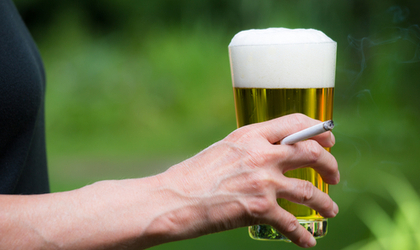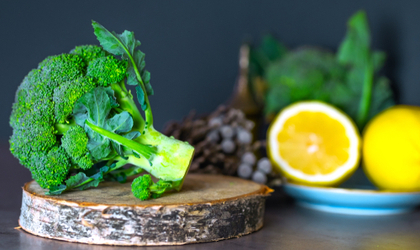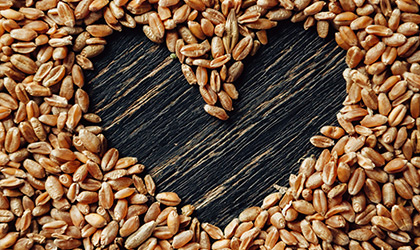
As the largest organ in your body, your liver is charged with some pretty big responsibilities: processing nutrients, filtering the blood, producing proteins for blood clotting and much more. As you can imagine, then, your body will find itself in a spot of bother if your liver health is compromised. You might be surprised to learn it’s not just alcohol that can harm your liver. Myriad factors can affect the overall wellbeing of this major organ: lifestyle habits, diet, exercise, and even medication. Here’s what you should steer clear of to keep your liver fighting fit.
Smoking
It’s widely acknowledged that cigarette smoke can lead to a host of life-threatening conditions, including lung and heart disease, but did you know it can severely damage your liver, too? Yes, here’s yet another reason to quit. You see, the herculean amount of toxic chemicals in tobacco sparks inflammation in the body, which can eventually result in serious liver damage. Worse still, smoking triggers the production of cytokines – chemicals that exacerbate inflammation and injury to the liver cells. Tempted by a cigarette with your glass of vino? Think again. Adding alcohol to the mix will only amplify the toll on your liver. That being said, we understand stubbing out smoking can be enormously challenging, so be sure to get all the help you need to live a smoke-free life, whether it be hypnotherapy or mindfulness or just plain cold-turkey, you’ve got this!
Not watching your weight
Beyond impacting blood pressure, cholesterol, and heart health, obesity is known to play a significant role in the development of a liver condition, which now affects 1 in 3 people living in the UKi). Indeed, a healthy liver should contain a negligible amount of fat. If this organ consists of more than 5% fat, then it’s considered ‘fatty’ and will pave the way for myriad health concernsii. Insulin resistance – a common side effect of excess fat tissue in the abdomen is a key factor in liver health. When you’re insulin resistant, your muscles, fat, and liver cells can’t respond properly to this hormone. As a result, insulin accumulates in the blood and increases the number of fatty acids circulating in the bloodstream. When these insidious fat molecules drive into liver cells, scarring and liver failure can manifest. The best thing you can do for your liver (and the rest of your body) is trim down.
Leading a sedentary lifestyle
Unsurprisingly, obesity and inactivity go hand in hand. And a growing raft of evidence purports that leading primarily sedentary lives and being in a perpetual state of over nutrition are major contributors to the increase of liver conditionsiii. One study revealed those with a liver condition had both decreased resistance training and aerobic physical activityiv. Simply put, exercise is a powerful weapon to keep your liver cells healthy. It really ought to become a pillar of your daily routine. Though moving your body in any way, shape, or form has shown immense promise in supporting liver health; high-intensity interval training (HIIT) appears to come up trumps. In one study, individuals lost a whopping 39% of their liver fat after a 12-week HIIT programmev. Whatever activity you settle for, just make sure you’re exercising consistently. Find something you enjoy and stick to it. Discover more about the importance of physical activity for liver health.
Eating an unhealthy diet
Never underestimate the powerful effect food choices can have on your liver. Chowing down on sugar, saturated fat, and refined carbohydrates will overload the liver. In a 3-week study on obese adults, scientists discovered those who ate a diet rich in unhealthy calories and refined carbohydrates experienced a 27% swell in liver fat, while their overall body weight only increased by 2%vi. Avoid going overboard with the salt-shaker, too. Excess sodium can trigger water retention and inflammation in the stomach – both of which conspire to tax the liver. Replace junk food and any beige (yes – pizza, pasta, and pastries, we’re looking at you) with plenty of fibre, fruit, veggies, monounsaturated fats, and protein. Make a conscious effort to eat foods in their ‘whole’ form; anything refined and processed will only further compromise the liver. Find out which are the best foods to promote liver health here
Guzzling fizzy drinks
Thanks to their extraordinarily high sugar content, fizzy drinks are some of the worst liver health hijackers. In one study published by The Journal of Hepatology, researchers found that participants who drank one or more fizzy drinks per day had higher markers of a liver condition than their counterparts who refrained from guzzling the sugary stuffvii. Liver conditions were much higher in overweight and obese individuals, too. Previous research substantiated these results, revealing that people who consumed two sugary drinks a day for six months exhibited hallmark symptoms of a liver conditionviii. The take-home message? Ditch the sugary stuff for healthier alternatives. How does sparkling mineral water with fresh fruit sound?
Drinking to excess
The notion that chronic drinking doesn’t bode well for liver health isn’t anything new. While this major organ can, admittedly, tolerate small amounts of alcohol, drinking too much or too fast can severely overload your liver cells. You see, when that ice-cold beer reaches your liver, it produces a harmful enzyme called acetaldehyde, which can ravage liver cells and may, overtime, even lead to permanent scarring. In many cases, the damage associated with drinking is retrievable, granted you limit your alcohol intake or become teetotal. But once the condition crosses the line into severe scarring, it’s very possible you won’t be able to turn back. Be mindful that the UK drinking guidelines urge both men and women against consuming more than 14 units of alcohol per week. To put this into perspective: this equates to 7 medium-sized glasses of wine (12%) or 6 pints of beer (4%). If you tend to guzzle all 14 units every week, make sure you disperse your alcohol consumption over three or more days. And remember, avoid ‘saving up’ your units. Binge drinking puts too much strain on your liver.
References:
-
NHS.UK. (2019). Non-alcoholic fatty liver disease (NAFLD). Available online: https://www.nhs.uk/conditions/non-alcoholic-fatty-liver-disease [Accessed 6 May. 2019].
-
Ahmed. M. (2015). Non-alcoholic fatty liver disease in 2015. World journal of hepatology. ;7(11), 1450–1459.
-
Rector. R. & Thyfault. J. (2011). Does physical inactivity cause nonalcoholic fatty liver disease? Journal of Applied Physiology. ;111(6), pp.1828-1835.
-
Rector. R., Nitzan-Kaluski. D., Goldsmith. R., Webb. M., Zvibel. I., Goldiner. I., Blendis. L., Halpern. Z. & Oren. R. (2008). Role of leisure-time physical activity in nonalcoholic fatty liver disease: A population-based study. Hepatology. ;48(6), pp.1791-1798.
-
Cassidy. S., Thoma. C., Hallsworth. K., Parikh. J., Hollingsworth. K., Taylor. R., Jakovljevic. D. & Trenell. M. (2015). High intensity intermittent exercise improves cardiac structure and function and reduces liver fat in patients with type 2 diabetes: a randomised controlled trial. Diabetologia. ;59(1), 56-66.
-
Sevastianova. K., Santos. A., Kotronen. A., Hakkarainen. A., Makkonen. J., Silander. K., Peltonen. M., Romeo. S., Lundbom. J., Lundbom. N., Olkkonen. V., Gylling. H., Fielding. B., Rissanen. A. & Yki-Järvinen. H. (2012). Effect of short-term carbohydrate overfeeding and long-term weight loss on liver fat in overweight humans. The American Journal of Clinical Nutrition. ;96(4), 727-734.
-
Ma. J., Fox. C., Jacques. P., Speliotes. E., Hoffmann. U., Smith. C., Saltzman. E. & McKeown. N. (2015). Sugar-sweetened beverage, diet soda, and fatty liver disease in the Framingham Heart Study cohorts. Journal of Hepatology. ;63(2), 462-469.
-
Bray. G. & Popkin. B. (2013). Calorie-sweetened beverages and fructose: what have we learned 10 years later. Pediatric Obesity. ;8(4), 242-248.
You Might Also Like

Keri
Keri Filtness has worked in the Nutrition Industry for 19 years. She is regularly called upon for her professional comments on health and nutrition related news. Her opinions have been featured by BBC3, Prima, Vitality, The Mirror, Woman’s Own and Cycling Weekly, amongst others. She has also worked one to one with journalists, analysing their diets and health concerns and recommending changes and additions, where appropriate.
View More



